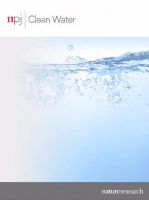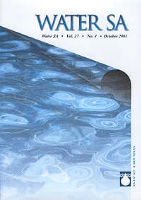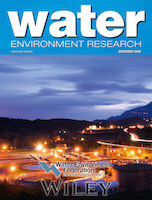
Water Research X
Scope & Guideline
Leading the charge in water science innovation.
Introduction
Aims and Scopes
- Water Quality Assessment and Management:
The journal emphasizes research on the assessment of water quality, including the detection and quantification of contaminants, pathogens, and pollutants in various water bodies. It explores innovative methodologies for monitoring and managing water quality. - Wastewater Treatment Technologies:
A significant focus is on the development and optimization of wastewater treatment processes, including biological, chemical, and advanced oxidation methods. This includes studies on nitrogen and phosphorus removal, sludge management, and resource recovery. - Hydrological Studies and Modeling:
Research related to hydrology, including water cycle dynamics, surface and groundwater interactions, and modeling of water resources, is a core area. The journal publishes findings that integrate experimental data with computational models. - Sustainable Water Management Practices:
The journal promotes sustainable practices in water management, including water reuse, recycling, and conservation strategies. It explores socio-economic impacts, resilience, and policy implications associated with water scarcity and climate change. - Emerging Contaminants and Environmental Impact:
Research on emerging contaminants, such as pharmaceuticals and microplastics, is increasingly important. The journal addresses their sources, fate, and transport in aquatic environments, alongside their ecological impacts. - Innovative Technologies in Water Treatment:
The journal highlights advancements in water treatment technologies, including the use of machine learning, sensor technologies, and nanotechnology for improved water quality management. It focuses on the integration of these technologies into existing systems.
Trending and Emerging
- Advanced Wastewater Treatment and Resource Recovery:
There is a growing emphasis on advanced wastewater treatment technologies that not only aim for contaminant removal but also focus on resource recovery, such as nutrients and energy from wastewater. - Machine Learning and Data Analytics:
The integration of machine learning and data analytics into water quality modeling and management is increasingly prevalent. This trend reflects the need for predictive tools and smart water management solutions. - Impact of Climate Change on Water Resources:
Research addressing the impacts of climate change on water availability and quality is gaining traction. This includes studies on hydrological modeling and adaptation strategies for water management. - Microbial Ecology in Water Treatment:
The role of microbial communities in water treatment processes is an emerging focus. Research is increasingly examining the dynamics and contributions of microbial populations to treatment efficiency. - Wastewater Surveillance for Public Health:
The use of wastewater surveillance to monitor public health, particularly in relation to viral outbreaks like COVID-19, has emerged as a critical area of research, showcasing the intersection of water science and public health. - Environmental Justice and Water Equity:
Emerging discussions around environmental justice and equitable access to clean water are becoming more prominent. This trend highlights the socio-political aspects of water management and the need for inclusive practices.
Declining or Waning
- Traditional Water Supply Systems:
Research focused on conventional water supply systems is declining as interest shifts towards innovative and decentralized water management solutions. The emphasis is moving towards sustainability and resilience in urban water systems. - Chemical Disinfection Methods:
While chemical disinfection remains important, research in this area is waning in favor of emerging technologies such as UV disinfection and advanced oxidation processes. The focus is shifting towards methods that minimize chemical usage and environmental impact. - Basic Water Quality Parameters:
Studies centered solely on basic water quality parameters (e.g., pH, turbidity) are becoming less frequent as the field increasingly emphasizes more complex interactions and the effects of emerging contaminants on water quality. - Static Modeling Approaches:
The use of static models in water quality assessment is declining, with a growing preference for dynamic and adaptive modeling approaches that incorporate real-time data and machine learning techniques.
Similar Journals

Hydrology
Connecting scholars to shape the future of hydrology.Hydrology, published by MDPI, is a prominent open-access journal dedicated to advancing the field of hydrological science. Since its establishment in 2014, the journal has garnered a reputation for excellence, reflected in its classification within the Q2 quartile for 2023 across multiple categories including Earth-Surface Processes, Oceanography, Water Science and Technology, and Waste Management and Disposal. Based in Switzerland, Hydrology provides a vital platform for scholars and practitioners to disseminate research findings, promote innovative methodologies, and foster discussions on current trends affecting water resources and management globally. The journal is easily accessible online and aims to significantly contribute to the understanding of hydrological processes, offering insights that are pivotal for addressing contemporary environmental challenges. With Scopus rankings showcasing its growing influence, Hydrology is a crucial resource for researchers, students, and professionals committed to water science and sustainable practices.

Journal of Applied Water Engineering and Research
Navigating Challenges in Water Engineering and SustainabilityJournal of Applied Water Engineering and Research is a dynamic platform dedicated to the advancement of knowledge in the field of water science and technology. Published by Taylor & Francis Ltd, this journal aims to bridge the gap between theoretical research and practical applications in water engineering, providing a crucial resource for researchers, practitioners, and policymakers. With an ISSN of 2324-9676 and an impressive ranking in the Q3 category for Water Science and Technology, it occupies a distinctive position within the scholarly community. The journal covers a wide spectrum of topics, including innovative water management strategies, sustainable practices, and the integration of technology in water resource management, thus contributing significantly to the discourse surrounding environmental sustainability. With publication years converging from 2013 to 2024, the Journal of Applied Water Engineering and Research continues to foster impactful research, enhancing our understanding and management of vital water resources.

npj Clean Water
Transforming water challenges into actionable insights.npj Clean Water, published by NATURE PORTFOLIO, is a premier open-access journal dedicated to advancing the field of water science and technology. Since its launch in 2018, this innovative publication has quickly established itself as a leading platform for original research and policy discussions concerning clean water access and quality. With an impressive impact factor and categorized in the Q1 Quartile across multiple environmental science disciplines—including management, monitoring, pollution, and waste management—npj Clean Water stands out for its rigorous peer-review process and commitment to disseminating high-quality research. Researchers, professionals, and students involved in water-related challenges will find invaluable insights that address critical environmental issues and promote sustainable practices. Access to articles is freely available, encouraging global collaboration and knowledge sharing within the water sector. This journal embodies a significant step towards achieving innovation and policy advancements in the pursuit of a cleaner, safer water future.

Hydrologie und Wasserbewirtschaftung
Pioneering solutions for global water issues.Hydrologie und Wasserbewirtschaftung, published by the BUNDESANSTALT GEWASSERKUNDE-BFG, stands as a vital open access journal in the field of hydrology and water management since its inception in 1999. Based in Germany, this journal aims to disseminate high-quality research related to water resources, environmental sustainability, and innovative management strategies. Though it has a Q4 ranking in Water Science and Technology for 2023, and holds a Scopus rank of 113 out of 225, the journal provides an essential platform for researchers, professionals, and students interested in advancing their understanding of water science. With coverage spanning from 1999 to 2018 and a seamless move to an open access model, Hydrologie und Wasserbewirtschaftung remains committed to contributing to the ongoing dialogue around critical water issues. Researchers looking to publish their findings or stay abreast of developments in water science will find this journal indispensable.

Hydrology Research
Fostering collaboration in the field of hydrology.Hydrology Research, a leading academic journal published by IWA Publishing, is dedicated to advancing the field of water science and technology. With an impressive impact factor and a Q2 ranking in its category, the journal plays a pivotal role in disseminating innovative research and practices in hydrology. Established in 1973 and transitioning to an Open Access model in 2020, it provides unrestricted access to high-quality articles that cover a broad spectrum of topics, including hydrological processes, water management, and environmental impact assessments. Situated in Denmark, Hydrology Research continues to thrive as an essential platform for researchers, professionals, and students alike, encouraging the exchange of ideas that contribute to sustainable water solutions worldwide. With a comprehensive coverage of research converging from 1973 to 2024, it stands as a testament to ongoing progress in the water science community.

WATER SA
Advancing water science for a sustainable future.WATER SA, published by the WATER RESEARCH COMMISSION, serves as a pivotal platform for interdisciplinary research in the areas of water science and technology. With an ISSN of 0378-4738 and an E-ISSN of 1816-7950, this open-access journal has been committed to disseminating knowledge since 2005, ensuring that research is freely accessible to a global audience. As of 2023, it holds a Q3 ranking in several key categories including Applied Microbiology and Biotechnology, Management, Monitoring, Policy and Law, Waste Management and Disposal, and Water Science and Technology. These rankings reflect its significant contribution to these disciplines, particularly in South Africa where it is based. With a history dating back to 1976 and converging research efforts extending through 2024, WATER SA aims to illuminate pressing water-related challenges and foster innovative solutions through rigorous scientific inquiry. Researchers, professionals, and students interested in the sustainability and management of water resources will find its comprehensive portfolio essential for advancing their work and understanding in an increasingly critical field.

Journal of Water Management Modeling
Transforming Water Resources Through Collaborative ResearchThe Journal of Water Management Modeling, published by COMPUTATIONAL HYDRAULICS INT, stands as a pivotal resource in the fields of Civil and Structural Engineering, Geography, Planning and Development, and Water Science and Technology. With an ISSN of 2292-6062, this Canadian-based journal has earned its reputation by exploring innovative modeling approaches to enhance water management, crucial in addressing today's environmental challenges. Despite its current Q3 status in Civil and Structural Engineering and Water Science categories, alongside a respectable Q2 rank in Geography, the journal is committed to advancing knowledge and fostering collaboration among researchers, practitioners, and students passionate about the sustainable management of water resources. The journal operates on an open-access model, ensuring research is readily available to a broad audience, and has converged its editorial focus from 2018 to 2024, continuously adapting to emerging trends and technologies within the discipline. As a part of the global conversation regarding effective water management, it plays a vital role in informing policies and practices that impact communities and ecosystems alike.

Water Resources and Industry
Fostering Collaboration for Global Water ChallengesWater Resources and Industry, published by Elsevier, stands at the forefront of research in the critical fields of water science and technology, as well as geography, planning, and development. With an impressive 2023 impact factor that places it in the Q1 category for both Geography and Water Science on a global scale, this journal is a vital resource for academics, professionals, and students seeking to advance their understanding of water-related issues impacting industries worldwide. Since its inception in 2013 as an Open Access journal, it has fostered innovative research and practical solutions to challenges in water resource management. Located in the vibrant academic hub of Amsterdam, the journal encourages submissions that cover a broad spectrum of topics, from sustainable practices and policy development to technological advancements in water treatment and distribution. By making its research publicly accessible, Water Resources and Industry not only contributes to scholarly discourse but also empowers stakeholders to implement evidence-based strategies for water sustainability, thereby enhancing its relevance and impact in today's world.

Water Conservation Science and Engineering
Innovating Tomorrow's Water Conservation StrategiesWater Conservation Science and Engineering, published by SPRINGERNATURE, is a vital academic journal dedicated to advancing the fields of environmental engineering, ocean engineering, waste management, and water science and technology. Since its inception in 2016, the journal has quickly established itself within the academic community, achieving a commendable Q3 ranking across multiple categories in 2023. With an ISSN of 2366-3340 and an E-ISSN of 2364-5687, it is accessible to a global readership eager to explore the latest research and innovations in water conservation and sustainable practices. Although currently not open access, the journal is committed to publishing high-quality scholarly articles that provide insights into effective water management strategies, innovative engineering solutions, and the critical importance of preserving our water resources. Based in Singapore, Water Conservation Science and Engineering aims to foster interdisciplinary collaboration among researchers, professionals, and students, making it an essential resource for anyone passionate about environmental sustainability and preservation.

WATER ENVIRONMENT RESEARCH
Transforming knowledge into action for water sustainability.WATER ENVIRONMENT RESEARCH is a leading scholarly journal dedicated to disseminating cutting-edge research in the fields of water science and technology. Published by WILEY, this esteemed journal (ISSN: 1061-4303; E-ISSN: 1554-7531) is renowned for its rigorous peer-reviewed articles that explore critical issues related to ecological modeling, environmental chemistry, pollution, and waste management. Established in 1992 and continuing through 2024, WATER ENVIRONMENT RESEARCH has secured a notable position within its category quartiles, ranking in the Q2 tier for several disciplines, including ecological modeling and water science and technology. It is highly regarded in the Scopus database, holding a rank of #53 out of 261 journals in Environmental Science related to Water Science and Technology, positioning it in the 79th percentile. As it continues to bridge research and practice, this journal serves as an essential resource for researchers, professionals, and students striving to advance knowledge and foster sustainable solutions within the water environment sector.